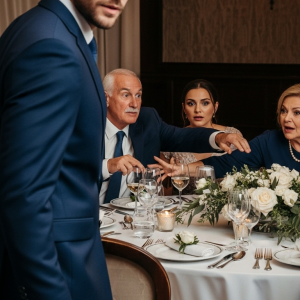I never imagined the day I’d be sitting across from my stepmother in a lawyer’s office, the air so thick you could cut it with a knife. My name is Amelia Carter, I am thirty-one years old, and for the last thirteen years, I have lived a life far removed from the cold marble halls of my father’s mansion.
Vanessa, my stepmother, a woman who wore diamonds like armor, looked at me with unconcealed disdain. She was certain she knew exactly how the reading of my father’s $154 million will would play out. And honestly, so did I.
Before Vanessa, before the bitterness and the slammed doors, there was sunshine. I grew up in Portland, in a house that always faintly smelled of my mother, Claire’s, lavender hand cream. My father, Richard Carter, was a tall, commanding man, but at home, he was simply Dad—warm, playful, and unafraid to make a fool of himself just to hear me laugh. My mother was his perfect opposite, gentle, soft-spoken, and endlessly patient.
We weren’t wealthy then, but we had a comfortable life. Dad owned a mid-sized construction company and worked long hours, but the weekends were ours. My memory is filled with images of Dad in an old flannel shirt making pancakes, and Mom humming as she watered the roses outside.
The year I turned nine, everything shattered. It was a crisp, late autumn day. Dad was out of town on business. My mom picked me up from school, promising me a hot chocolate on the way home. We were crossing a quiet intersection when a delivery truck, ignoring a red light, barreled toward us.
I still remember the screech of the tires, my mother’s gasp of terror, and then the crushing impact. My next memory is of being on the pavement, my leg throbbing, my own screams ringing in my ears. My mother was still. She was gone before the ambulance reached the hospital.
For weeks, I lived in a fog. My father buried himself in his work. He tried to be strong, but I could see the cracks—the way his voice would break when he said her name, the hollow look in his eyes when he returned to a now-empty house. For a while, I thought we could heal each other. We ate dinner in silence, holding hands across the table. But grief is a strange thing; it can either bind two people together or slowly pull them apart.
Dad started taking more business trips, staying away longer. With each one, he grew a little more distant. And then, one day, Vanessa Price entered our lives.
She was a real estate agent, nearly twenty years younger than my father, with glossy chestnut hair and a smile that seemed more practiced than genuine. We first met at a fancy steakhouse. Vanessa wore a dress that made my own clothes feel shabby and a diamond necklace that caught the light with every move.
She made an effort. The polite questions about school and my hobbies felt like items on a checklist. She laughed at my father’s jokes, a little too loudly, and touched his arm a little too often. “Amelia, you should really learn from Sophie,” she once told me, referring to her own toddler daughter. “She just loves wearing nice clothes.” Every word was a little needle, an implicit comparison where I always came up short.
Three months later, they announced their engagement.
The house stopped feeling like home. The walls were repainted a stark white. My mother’s rose-patterned curtains were replaced with heavy, burgundy silk drapes. Family photos vanished from the hallway. The gentle scent of lavender was suffocated by Vanessa’s sharp, musky perfume. My father changed, too. He started talking about “social networking” and “appearances.” Our house was now filled with smiling strangers and champagne glasses. I had become a ghost in my own home.
By the time I was eighteen, I knew I couldn’t stay. The night before I left for college in San Francisco, Dad came to my room. He sat on the edge of my bed, his expression weary. “I know it hasn’t been easy,” he said quietly. “But she… she helps me get through. I just wish you could try.”
“I have tried, Dad,” I replied, and it was the truth.
I had tried to be a shadow at Vanessa’s parties, to ignore her constant critiques, to understand the man my father was becoming. But I was exhausted. The next morning, I packed my bags, gave my father a quick, stiff hug in the foyer, and left without looking back.
Life in San Francisco was hard but freeing. I worked two part-time jobs to pay my way through college—mornings at a bakery, evenings clearing tables at an Italian restaurant. My hands were always chapped, and my feet ached, but this exhaustion was mine. It was the price of independence.
Every few months, Dad would call, usually when Vanessa was out. The conversations were short, filled with awkward silences. He’d ask about school, about my health. I knew he felt guilty, but neither of us knew how to bridge the chasm that had grown between us.
After graduation, instead of a corporate job, I decided to open a small coffee shop in Seattle. I called it “Lavender Steam,” in honor of my mother. It was my sanctuary, a place built not with money, but with tireless hours and passion. I painted the walls, chose every table, and wrote the menu on a chalkboard each morning.
The café became my life. Slowly, the regulars started to come, each with a story, and they became my chosen family. In those quiet years, I healed. I built a life that had nothing to do with my father’s fortune or Vanessa’s approval.
And then, one cold February morning, the phone rang. A clipped, unfamiliar voice spoke. “Is this Ms. Amelia Carter?”
“Yes,” I answered cautiously.
“This is Mr. Daniels, your father’s personal assistant. I’m sorry to inform you that Mr. Carter’s health has taken a serious turn. He’s been admitted to the hospital in Portland.”
My world stopped.
When I arrived at the hospital, Vanessa blocked me at the door to his room. She was dressed in a sleek black suit, as if already prepared for a funeral. “What are you doing here, Amelia?” she hissed, her voice low but venomous. “Your father is resting. You don’t need to be here.”
I pushed past her. My father was lying in the hospital bed, his skin pale, his frame shrunken and connected to a web of tubes and wires. But when he saw me, his eyes lit up. “Amelia,” he rasped.
I sat down beside him, taking his cold hand in mine. “I’m here, Dad.”
“I’m sorry,” he said, a tear tracing a path down his temple. “For not being brave enough… to protect you.”
“It’s okay, Dad,” I said, even though it was a lie.
“I’ve made arrangements,” he whispered. “You’ll understand when the time comes… Trust me.”
Those were the last words he ever spoke to me. Two weeks later, he passed away. Vanessa didn’t call to tell me. I found out from a distant cousin.
And so, here I was, in this stuffy lawyer’s office, facing Vanessa’s smug smile. My father’s longtime attorney, Mr. Harris, a kind-eyed older man, entered the room. He gave me a solemn nod before taking his seat at the head of the table.
“Good morning,” he said, his tone professional. “We are here to read the last will and testament of Richard Carter.”
Vanessa sat up straighter, her arms crossed. Mr. Harris began, reading through the formal legal language, confirming my father was of sound mind. Then, he got to the main clause.
“I, Richard Carter,” Mr. Harris read, “do hereby leave the entirety of my estate… including any real property, liquid assets, and personal belongings… to my wife, Vanessa Carter, and our children, Lucas Carter and Sophie Carter.”
A triumphant smile spread across Vanessa’s face. Lucas smirked. Sophie shot me a look of pure glee. I felt a cold shock, but not surprise. This was exactly what Vanessa had said would happen.
Mr. Harris paused, turning a page. He glanced around the room, and I could have sworn I saw a flicker of amusement in his eyes before he continued.
“All the aforementioned property,” he read, his voice clear and deliberate, “which consists of the cabin property in rural Montana and the 2001 pickup truck.”
The room went dead silent.
Vanessa’s smile froze. “Excuse me?” she interrupted, her confidence beginning to fracture. “Just the cabin and an old truck? There must be a mistake.”
Mr. Harris looked at her over his glasses. “There is no mistake, madam. The rest of the estate is handled under a separate document.” He pulled out another, thicker folder. “Three years ago, Mr. Carter created an irrevocable trust.”
The color drained from Vanessa’s face. “That trust… who is the beneficiary?”
Mr. Harris didn’t answer her directly. Instead, his eyes found mine. A slow, almost imperceptible smile curved his lips.
“The sole beneficiary of the trust,” he announced, “which includes all company shares of Carter Construction, the investment portfolio, the main residence in Portland, the beach house, the yacht, and all associated accounts… is his daughter, Amelia Carter.”
The room erupted. Vanessa shot to her feet, her chair clattering backward. “IMPOSSIBLE!” she shrieked, her voice shrill. “He would never! You manipulated him! You tricked him!”
Lucas swore under his breath, while Sophie burst into tears.
Mr. Harris remained perfectly calm. He slid a copy of the trust agreement across the table. “Mr. Carter’s signature is unmistakable, and it was notarized. He made this decision years ago, while in perfect health. His instructions were clear.” He looked at me, his voice softening. “He said you were the only one who understood the value of what he’d built. And he trusted you to protect his legacy.”
I stared at the documents, at my father’s familiar handwriting. And I understood. These were his arrangements. This was his way of saying sorry, his way of making things right. He hadn’t abandoned me. He had protected me in the only way he knew how.
I looked up at Vanessa, the woman who had tried to erase me from my father’s life. Her face was now a mask of pure rage and panic. She had won the small battles, but my father had made sure I won the war.
I slowly stood, gathering my documents. I didn’t say a word to them. I simply looked at Mr. Harris and nodded my thanks.
As I walked out of the office and into the sunlight, I didn’t feel triumph. I felt a deep, profound peace, a sad sort of relief. The fight was over. And finally, I was free.
Vanessa didn’t take it well.
I hadn’t even reached the elevator when her voice followed me down the hallway. “This isn’t over, Amelia! You think you’ve won?”
I paused just long enough to glance over my shoulder. She stood framed in the doorway, hair wild, her perfectly powdered face now blotched red with fury. For the first time, she looked less like a queen and more like a dethroned pretender.
“It’s not about winning,” I said. “It never was.”
And I meant it. This wasn’t revenge. It was restoration. My father had given me back what she tried to erase: my place, my voice, my legacy.
That night, I returned to Seattle. Lavender Steam was quiet, the last few regulars nursing their drinks under soft pendant lights. My manager, Lila, greeted me with a nervous smile.
“Everything okay?” she asked.
I nodded. “It will be.”
We closed up together, just like we used to before I handed over day-to-day operations. The moment I stepped behind the counter, wiped down the register, and took that familiar breath of coffee and vanilla, I felt grounded again. This was still mine, no matter what happened next.
But things did change.
Mr. Harris contacted me the next morning. There were business matters to discuss: transfer of shares, asset management, and the surprising discovery that Carter Construction was being quietly dismantled by Vanessa and her children. Contracts had been mismanaged. Funds siphoned.
“Your father suspected this,” Mr. Harris said. “That’s why he acted when he did. He wanted to shield the company. You need to decide how involved you want to be, Amelia.”
The weight of it all threatened to crush me. Millions of dollars. Hundreds of employees. My father’s legacy.
I didn’t sleep for two nights.
But on the third, I stood in front of the old Carter Construction building and watched as the early crew clocked in. Men and women in work boots and neon vests, all of them showing up like my father had for decades. I thought of him at the stove flipping pancakes, of his rough hands guiding mine as I held a hammer for the first time.
I stepped inside.
Within weeks, I had moved part-time to Portland, splitting my life between the cafe and the company. I didn’t pretend to know everything. I sat in on meetings, asked questions, surrounded myself with the people my father had trusted. Slowly, I rebuilt what Vanessa had tried to hollow out. I brought in ethical accountants, re-signed old contracts, and personally called every longtime client to let them know Carter Construction was back.
Word got around fast.
Vanessa tried to sue. She claimed undue influence, elder abuse, fraud. Her lawyers sent threats. Mr. Harris, calm as ever, handled it all with surgical precision.
“Let them come,” he said. “Your father left a clear paper trail. Every document, every transfer. She has no case.”
Still, she tried. The courtroom battle was brutal. Vanessa wept on the stand, told wild tales of me manipulating a dying man. Her children painted themselves as victims, abandoned and destitute.
The judge wasn’t moved.
After two months, her case was dismissed.
The media had a field day. “Stepmother Spurned,” the headlines read. “Heiress Restores Family Empire.”
I kept my head down. My only interview was for a trade magazine, where I spoke about ethical construction practices and honoring my father’s values. I refused offers for book deals, reality shows, even a podcast.
“I just want to build things that last,” I told the reporter. And I meant it.
One day, about six months after the trust was activated, I found an envelope on my doorstep in Seattle. There was no return address. Inside, a single photograph: my mother, smiling in front of her rose bushes, sunlight on her face. On the back, in shaky handwriting, were the words: “She would be proud.”
No signature.
I stood on my porch for a long time, clutching that photo. My eyes stung. I hadn’t cried in months.
Eventually, I framed it and placed it on the mantle of the new apartment I had just bought in Portland—a modest place near the river. I had no intention of moving back into my father’s mansion. That house had too many ghosts.
Vanessa, from what I heard, had moved to Arizona, where she lived with a man twenty years younger. Sophie cut ties with the family. Lucas tried to launch a startup but failed within months. They faded from the public eye. And I let them.
I hired Emily, a brilliant young architect from my father’s alma mater. Together, we launched a new division of Carter Construction focused on sustainable, affordable housing.
Lavender Steam kept thriving. Every month, I spent a week there, reconnecting with customers, checking on Lila, refilling chalkboard menus with my own hand.
At the end of the year, I stood on a stage at the Portland Chamber of Commerce, accepting an award in my father’s name. I spoke briefly, voice steady:
“Legacy isn’t what you leave behind in dollars. It’s what you build in the people who remember you.”
The applause was loud, but it was the quiet afterward that mattered more.
I stepped off the stage and into a life fully mine.
And I never looked back.




